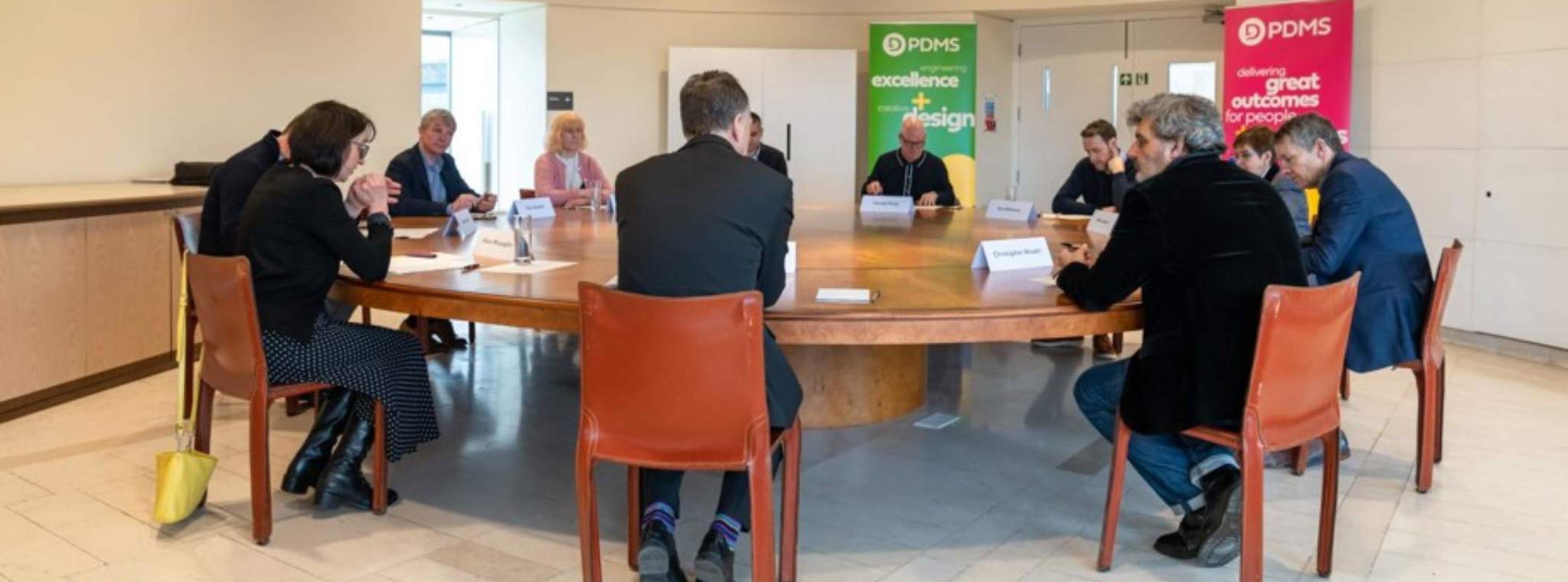Scotland Data Futures Forum: Collaboration key to digital transformation
Graham Lironi, Co-founder and Director of Liquorice Media, eavesdrops on the Data Futures Forum roundtable discussion in the boardroom of the National Museum of Scotland in Edinburgh to hear how data and digital transformation can help public services respond to the new economic reality.
In a wide-ranging conversation, Chair Alison McLaughlin hears a high-level panel arrive at a consensus that a regular series of discussions amongst public sector organisations could play a vital role in delivering digital transformation.
Chair – Alison McLaughlin, Freelance Consultant, and former Chair of ScotlandIS/Director of Digital Transformation at the Scottish Government.
Participants:
- Beth Lawton, Chief Digital & Information Officer, University of Strathclyde
- Chris Gledhill, Chief Executive, PDMS
- Christopher Wroath, Director of NES Digital, NHS Education for Scotland
- George Boag, Director of Data and Digital Services, Skills Development Scotland
- John Campbell, Digital Transformation Programme Director, Historic Environment Scotland
- Keith Dargie, CIO/DO, Crown Office & Procurator Fiscal Service
- Nigel Ironside, Head of Digital Services, Scottish Prison Service
- Shona Nicol, Head of Technical Data Policy, Scottish Government
- Tom Wilkinson, Chief Data Officer, Scottish Government
- Zahid Deen, Head of Operational Services & Transformation, Scottish Forestry
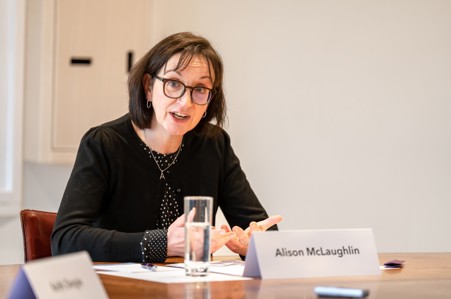
Alison McLaughlin
Chair Alison McLaughlin began the discussion by proposing that an outcome of Covid was the development of a widespread appreciation of the value of digital and data which underpin services and an unprecedented degree of collaboration across sectors and organisations at a rate of delivery hitherto unseen and asked how we harness that energy and momentum to help face today’s challenges? And with the cost-of-living crisis increasing pressure on public services, where are the biggest opportunities for digital and data to address these challenges?
Christopher Wroath highlighted the fact that the health service has a Community Health Index, a centralised piece of information which holds the demographics about an individual that allows a model for extracting the information you need about that individual then augmenting it with the service specific outcome sought.
“That works very effectively and, in a world where you’ve got real time calls for APIs (Application Programme Interfaces), why are we not heading that way?” he asked. “The key thing is legacy technologies – much of which are held over by large multinational companies who are inflexible and not interested in customer outcome.”
He suggested that governance is the reason we are less collaborative now than during Covid because the accountability officers from public sector organisations have reverted to how their operations worked pre-Covid and only assume responsibility for their organisation and not for improving outcomes for people in Scotland.
“We have to find a way to return to the situation where accountability officers can put the outcomes of people first and not the outcomes for their organisations,” he said.
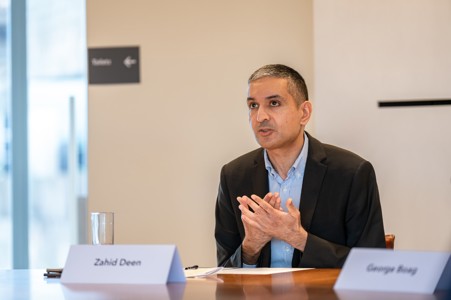
Zahid Deen
Zahid Deen suggested that we were able to respond quickly to Covid because we had a shared purpose with people focusing on outcomes and putting risks in perspective to these outcomes and posed the question of how we re-channel that focus.
“The one USP the public sector has vis-à-vis the private sector is that we can collaborate,” he said. “We’re not trying to eat each other’s profits so we should explore how to capitalise on that.”
Beth Lawton commented that while Covid allowed organisations to step outside of their systems because they had a national crisis to deal with, now that we’re going back into normality, organisations are working back with the same systems, processes and people with the same cultures that they had pre-pandemic as everyone said ‘let’s get back to normal’ and what they have not done as organisations is given enough thought to what normal ought to be and how we facilitate it.
“We’re never going to be agile organisations that can manage risk and respond in a flexible manner while we’re using legacy systems and companies have a vested interest in keeping us using these systems,” she said.
“Equally, all our processes are concerned with what you need to do to get the best out of those systems and our culture then works around that. Tech is the easy bit to change; it’s our people and our process that we need to spend time with because, otherwise, the system wins.”
Keith Dargie noted that, during Covid, emergency legislation drove the agenda in terms of using data and other technologies to get outcomes at pace which involved collaboration. In the justice sector there was a recover, renew and transform programme and he suggested that transformation is about not going back at a system level, but about trying to have that ambition to build new services in collaboration that can have improved outcomes.
“This is not about building big joined up systems – we’ve all got individual case management systems – it’s about national outcomes, about being focused on these service improvements,” he said.
“The big transformation opportunities for Scotland are where you don’t just look at an organisation level but at a system level and you try to understand how to deliver services. That’s where data is at the core of this." - Keith Dargie
“The need for all of us to deliver improved outcomes with less resource is going to be the agenda. It’s all about service improvements, innovation and about trying to transform.”
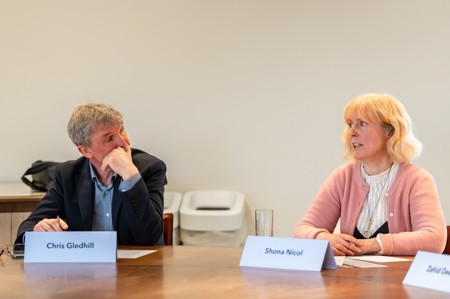
Chris Gledhill and Shona Nicol
Shona Nicol pointed out that her personal experience of dealing with some of these issues throughout Covid was that there were problems with the quality of data and suggested there is a need to consider data maturity and quality.
“It’s not just about governance, the data itself is a problem,” she said. “Organisational maturity impacts on the quality of the data that organisations have too.”
Tom Wilkinson asked whether, in normal times, when resources are not available to throw at a problem, we are in a fit state to do the things that were achieved during Covid and if, as well as governance, we need to address some technical fundamentals.
“It does feel like we’re moving towards leading major transformations of our institutions away from silos and an emphasis on individual accountability towards something more flexible and compatible with connections between different remits." - Tom Wilkinson
“That’s a huge challenge and we need to think within that about what digital technologies can do to help break people out of their silos, even where legislation and culture aren’t going to change quickly.”
Nigel Ironside agreed that while, during Covid, organisations were willing to assume risk as they developed digital systems to combat challenges, that risk appetite has since reduced as they revert to being mindful of the pounds and pennies on the basis that they now operate in a restricted fiscal environment. He agreed, too, that legacy systems represent a real challenge.
“As a government organisation, we rely heavily on operational systems based on a traditional forms-based database and being able to recover that data meaningfully and in an accessible way and format is a real challenge,” he said.
“It’s important that we set some data standards for digital transformation. If that means open-source data then, when designing new services, we design into a set of agreed standards across the public space, but that’s inordinately complex.”

John Campbell's name card, agenda and handouts
John Campbell noted that Covid changed the culture and that some people are suggesting we change the fundamentals. While acknowledging that this is the aspiration, he argued that small steps mean big changes and expressed an eagerness to see organisations think innovatively and have an ideation culture so that they can take an idea from within their organisation and evolve it, test it and have a scale of fail which is acceptable and makes it happen.
“It’s all about momentum and ideation and how do we then share and re-use, “ he said. “I do get frustrated seeing the same things done over and over again. Why do we not share information?”
George Boag agreed that crises drive innovation and that the crisis all public sector organisations face now is the tightening public purse. With organisations having to consider how they can do more for less, which opens up the prospect of collaboration, he suggested that they use that challenge as an impetus to drive innovation.
“I don’t think technology is the challenge, as much as governance and confidence, but, most importantly, having a shared sense of prioritisation across organisations,” he said.
One of the barriers he pointed to in terms of bringing different data sets from various organisations together is enabling the resources and prioritisation in these organisations into alignment.
“Technology is not the challenge and data is a big opportunity, but we have to take appropriate approaches around the management of data, and we want to automate that where possible, but in many cases we’ve not yet thought about the golden threads in terms of how we connect different data sets across organisations.”
He suggested that to develop a more data-capable culture across the public sector, we need to start with processes to shift behaviours.
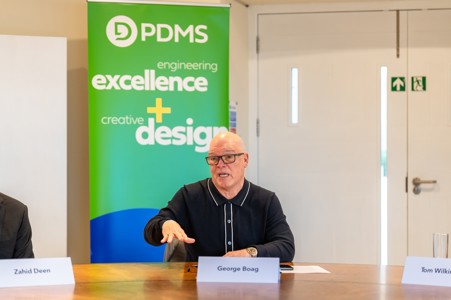
George Boag
“That’s not something that we’re going to do overnight but, to get more from data, organisations have to be more data aware and data literate,” he said.
Agreeing, Christopher Wroath said that we need to move to technologies that allow the flexibility for such golden threads of data sets from different organisations.
“We all know what is needed: data standards on flexible tech – it’s how to get there that’s the challenge,” he said, suggesting that we need the people leading organisations to be aware of these issues.
“Everybody around the figurative table that makes decisions on behalf of organisations with outcomes for the public needs to understand these issues and have resonance with what we’re saying about data,” he said.
Shona Nicol made the point that, while standards do exist, they are not always implemented, due to organisational maturity, which is a function of organisational culture and leadership.
“Many public sector organisations don’t have the skills or the tools in place or the leadership to back them up. One way to help organisations is by sharing experience about what they’ve done to get through some of these difficult challenges,” she said.
“We have to think about how we do this in a different way. Innovation is important. Is this way of setting standards the only way that we can do this, or can we speed this up by doing things differently?” - Shona Nicol
Zahid Deen suggested that, while organisations need digital specialists, they should explore how they can work together effectively so that not every organisation is seeking to build change internally, but pools resources.
Alison McLaughlin asked if there is a way to review investment in legacy systems and consider how to extend their lives, particularly within the fiscal constraints organisations operate under.

Chris Gledhill and Beth Lawton talking over refreshments
Noting that 30 years ago his organisation was building systems that are now legacy, Chris Gledhill drew an analogy with the 747 in that a passenger might board a 30-year-old aeroplane, but there will not be a single bolt on it that was put in by the original manufacturing process.
“Some of the most successful products and relationships we’ve had are those where we have built something with good information architecture and that system has evolved and connected to different devices that exploit it in different service models within the public sector,” he said.
Noting that technology software is unusual in that it weighs nothing and costs nothing once built in, he suggested that the licensing business model gets in the way of many of the things everyone is seeking to achieve because, in fact, the legacy system should be evolving continuously, and should be possible to be integrated to meet particular requirements and allow for collaboration between organisations.
“It’s the commercial constraints that get in the way, rather than the technical constraints,” he said.
“Legacy systems are systems which people operate and it’s the legacy of how people are used to using them as much as the actual systems that can be the issue. Often the perceived restrictions of a system are just that – a human perception about what you can’t do with that system.”
He suggested that finding ways to see across organisational boundaries, where costs are here and benefits are over there, is an important challenge.
“Those are battles public sector organisations have to fight; where there are huge benefits to the taxpayer, but they can’t be realised because of that separation of cost from benefit,” he argued.
“Budgets have two characteristics – they constrain what an organisation can spend, and they constrain the time within which they can spend it. That means benefits are often separated in time and across silos. Finding a way to be better at recognising the long-term benefits when these lie outside current budgetary constraints would help greatly.”
Commenting that he supposes that no-one around the table does not look at the looming end of March with horror when there’s a finite time within which to spend resources, Nigel Ironside suggested that there is a case for system maintenance and that innovation is right and proper.
“I agree that data awareness across organisations is important. We’ve all suddenly realised that data is probably the greatest asset that organisations have, so how do we protect it more? The data strategy we employ has to be around quality and accessibility and sharing, but market forces hamper our thinking, particularly in a finite 12-month period where we might not be allocated our budget until later in the year, which squeezes the timescales, particularly around procurement processes.” - Nigel Ironside
Beth Lawton observed that she had noticed a move from a capital funded IT model to Software as a Service, but what had yet to be considered was the impact that shift has on organisations’ budgets.
“Every organisation I’ve worked in has adopted the model of setting aside capital for investment, spending it on a big monolithic system and then sweating the asset, so when we suggest that in order to move away from those legacy systems because we need to be more responsive to our customer needs, our budgets are not set up for that change,” she said.
“We have to address those sorts of issues because otherwise we’ll never be able to get the kind of tech model that we need to be able to thrive in a digital world.”
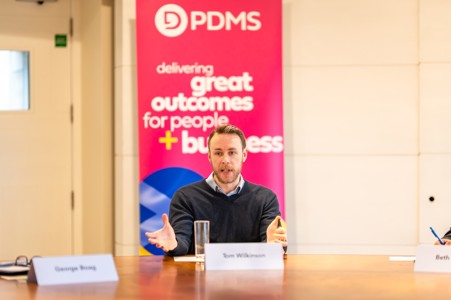
Tom Wilkinson
Tom Wilkinson said he would welcome ways for public sector organisations to share models of commercial arrangements that allow a more agile approach to software development but, noting that not all capital assets are the same (not all have resale value), expressed a hope that accounting itself will evolve to deal with different kinds of spending, while urging organisations to look ahead to avoid falling into the same traps.
“While I’ve seen a governmental shift towards open-source, I’ve also seen open-source software purposefully designed to be impossible for anyone else to work on because it’s so over-engineered – deliberately obfuscated – and software developed for one cloud provider may well only be used with that cloud provider,” he said.
He suggested that the public sector needs to address how it keeps up to date in that arms race between public sector and private sector and make sure that, whatever approach to vendor lock-in is being evolved in the private sector, the public sector is a step ahead, or keeping pace.
“We also need to think about what are the models that will protect the way we interact with the private sector from having those incentives,” he said.
“Could the public sector seek to introduce greater penalties on private sector organisations which are shown, after the fact, to have purposefully done something that locks us into a long-term relationship rather than the short-term service we think we’ve been paying for?”
Chris Gledhill agreed that while there is an enormous incentive to create proprietary lock-in, there’s a whole other area where there is professional engagement around a shared stake in the outcomes, where the public and private sectors are not adversarial if they create the right contractual arrangements and it is clear where the ‘win/win’ sits.
“It’s depressing as a supplier if you find yourself in a relationship predicated on the fact that you are adversarial with a relationship designed to extract maximum cash for minimum input,” he said.
“That is not how it should be and improving how we contract our relationships with one another is key to making sure that that isn’t what happens.”
Christopher Wroath suggested that this issue reflects the fact that the public sector have been notoriously bad customers and need to become good customers of technology.
“Technology has always been considered a ‘dark art’. It can’t be considered that way anymore because all public sector organisations are essentially technology organisations because you can’t be that organisation without the technology.” - Christopher Wroath
Returning to reflect on how organisations responded to the pandemic, Keith Dargie observed that he did not know of any organisation that had changed its core IT systems during that crisis, but that core to the response was data.
“Digital transformation is about information and doing collaborative things with service and improved outcomes; that’s where digital strategy and digital business function and that’s where digital strategy needs to be corporate driven,” he said.
“It’s not an IT strategy anymore, it’s about driving innovation. And if we’re bidding for scarce resources in a public sector, system level transformation for Scotland inevitably involves other organisations, and I wonder how we drive data standards and architecture principles without relying on Scottish government to hand it to us on a plate. It needs to be a collaboration right across the space.”

George Boag, Tom Wilksinson and Beth Lawton
With regard to legacy systems, George Boag noted that while it is easy to adopt a systems lens focus on issues, it might be more appropriate to take a data lens view.
“It’s not about the systems as such but about the data that sits in these systems and, from an organisational perspective, who owns that data. We need to consider how we leverage the value of that going forward,” he said.
“There’s also a business process perspective. As organisations, what are the critical business processes we have to do on a day-to-day basis that really add value?”
Beth Lawton brought the discussion to a conclusion by pointing out that, while public sector organisations are delivering a service to the citizen, the panel had yet to discuss how they might consider legacy systems through a customer lens and use what citizens need as justification for the change we want to see within organisations.
“The whole issue of holding people’s data and the trust that we need to have with our citizens in order to be able to do that and share it in a meaningful way is crucial,” she said.
“We saw how the plan to share health data was scuppered by public revolt. Citizens have no choice but to use us, but they have a tremendous influence on what will be successful and what won’t because if they refuse to engage with us or enable us to use their data that we consider necessary for the wider good, then we’re lost. So, we need to always have our citizens in mind."
